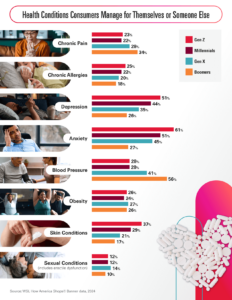Do certain over-the-counter medications present growth areas for pharma companies that would benefit retailers as well? WSL’s survey data of how many consumers take medications for a range of conditions suggest opportunities do exist for drug makers to convert their prescriptions to OTC.
An Ounce of Rx Conversion Can Lead to a Pound of OTC Sales
WSL tracks consumers in the drug category, we see the challenges at retail, and we have an idea. WSL can help drug makers determine the right retail strategy for converting select prescriptions to over-the-counter (OTC) options. We will interview retail executives most likely to support the drug and promote it, and also develop the playbook that will capture shopper attention.
Converting prescriptions to over-the-counter (OTC) options can help resolve these challenges. Further, research shows switching from Rx to OTC can reduce overall healthcare costs. According to the Consumer Healthcare Products Association, every $1 spent on OTCs saves the U.S. healthcare system $7.33.
For starters, the switch would reduce costs associated with doctor’s visits, from co-pays to taking time off work. Further, some Rx-to-OTC conversions would benefit the estimated 60 million Americans who may lack health and prescription insurance at some point in any year.
Hard Dollars: The Rx-to-OTC market is worth $38.7 billion and expected to reach $66.5 billion by 2033.
If drug manufacturers worked with retailers to build retail strategies for over-the-counter treatments – essentially mastering Rx-to-OTC conversions where it allowable – all parties, including shoppers, could benefit.
Our Research Suggests the Market Exists
In fact, the Rx-to-OTC market could be burgeoning. More than 700 products have switched from Rx to OTC since 1976, the Consumer Healthcare Products Association reports, including Pepcid, Claritin and the most recently announced Opill for birth control.
Are you surprised to learn the 28% of Millennials and Gen Z are on blood pressure medication, that more than 40% fill Rx for depressions and more than half take anxiety medication? In the total population, one- take diet Rx and that includes diet pills – remember them!
So where are the conversion opportunities? Our research shows that 66%[1] of all consumers take at least one prescription, and that 60% had purchased a prescription drug within the previous three months[2].
8 Rx-to-OTC Conversion Opportunities, by Category
Our research suggests other opportunities, as well. Following are the health conditions consumers manage for themselves or someone else. These categories can be targeted by drug makers determining the market size for Rx-to-OTC conversions.

The Challenge for Brick Pharmacies? Trust
These wellness categories present fresh areas where drug makers and retailers can strategize consumer solutions – particularly when trust and access to the pharmacist is waning.
Of those who fill their prescriptions in the store, 62% feel they do not need to speak to the pharmacist or are not willing wait in line for their turn to speak to the pharmacist.
We suspect part of the trust erosion stems from overwhelmed pharmacists who lack the time to consult. By switching some of those prescription drugs to OTC, the pharmacists could be freed up consult patient customers and regain their confidence. The trick is knowing which categories would benefit from the conversion the most.
This is Where WSL Comes In
WSL can help you form the right retail strategy to launch an Rx-to-OTC switch, and the consumer playbook to go with It.
Our data tracks how many consumers buy prescription and OTC categories, by age group and channel. Retailers and drug manufacturers can benefit from these insights. WSL can help you form the right retail strategy to launch your Rx-to-OTC strategy – which retailers to focus on and how they will support you.
If you’d like to launch shopper research that reveals specific category opportunities at your stores, or talk about a tailored Rx-to-OTC strategy, contact our consultants here.


